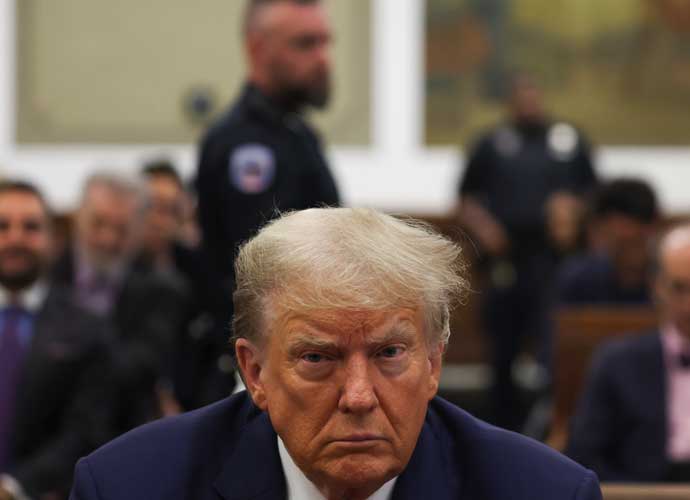

NEW YORK, NEW YORK - OCTOBER 3: Former U.S. President Donald Trump appears in the courtroom with his lawyers for his civil fraud trial at New York State Supreme Court on October 03, 2023 in New York City. Former President Trump may be forced to sell off his properties after Justice Arthur Engoron canceled his business certificates and ruled that he committed fraud for years while building his real estate empire after being sued by Attorney General Letitia James, who is seeking $250 million in damages. The trial will determine how much he and his companies will be penalized for the fraud. (Photo by Shannon Stapleton-Pool/Getty Images)
On Wednesday, the Supreme Court decided it would hear former President Donald Trump’s appeal for unqualified presidential immunity. The move will effectively delay the election interference case brought against him by the federal government and Special Counsel Jack Smith.
The Supreme Court has said they will hear opening arguments on the week of April 22. The original trial was set to begin in Washington, D.C., on March 4.
Trump’s appeal for presidential Immunity was originally rejected by Judge Tanya Chutkan, who is overseeing the case and then later rejected by a three-judge panel from D.C.’s lower appellate court. Smith asked the Supreme Court to take up the appeal at the outset of the case, but the court allowed the appeal to make its way through the lower courts, further delaying Trump’s trial.
The timing of the case is important to both sides. The prosecution is pushing for a “fair and speedy trial,” while Trump and his legal team have been clear about their desires to delay the former president’s multiple criminal trials until after the election.
Subscribe to our free weekly newsletter!
A week of political news in your in-box.
We find the news you need to know, so you don't have to.
Smith said in papers filed with the court that, “Delay in the resolution of these charges threaten to frustrate the public interest in a speedy and fair verdict.” Trump’s team has argued that the ongoing trials are political persecution and election interference by keeping Trump off the campaign trail.
Initial arguments will begin to be heard on April 22. In the only similar case, United States vs. Nixon, the Supreme Court issued its verdict, denying Nixon presidential privilege, 16 days after hearing arguments.
If the Court rules for Trump then the case against him would be dead. If the court rules against him, Judge Chutkan has said she will allow the Defense 88 days, the amount of time the trial has been delayed to prepare. If this timeline plays out, the stage will be set for a trial right before the general election.
Now that the precedent-setting case has landed in the high court’s lap, the legal question they are set to decide was formulated by the court as, “Weather, and if so to what extent does a former president enjoy presidential immunity from criminal prosecution for conduct alleged to involve official acts during his tenure in office?”
The framing of the case was set by the court after rejecting potential framing from both the prosecution and defense. Legal experts have said that this framing sets up the potential that if the court rules in favor of presidential immunity they could also define specific acts that do or do not fall under the new protections.
After the Supreme Court announced they would be hearing the case, Trump took to his social media platform Truth Social to again repeat his claim that without immunity, “A President will not be able to properly function, or make decisions in the best interests of the United States of America. Presidents will always be concerned or even paralyzed by the prospect of wrongful prosecution and retaliation after they leave office.”
Sen. John Fetterman (D-Pennsylvania) has had more top staff departures. Last week, Fetterman’s chief of…
Attorney General Pam Bondi has taken her criticism of Los Angeles protesters to the next…
The Trump Administration has a new plan to change the process of detaining and deporting…
Following President Donald Trump’s “Liberation Day” tariff announcement in April, members of Congress were unusually…
President Donald Trump’s approval rating has fallen to 38 percent, the lowest mark of his…
https://www.youtube.com/shorts/-5miskGO5lo California Senator Alex Padilla was forcibly removed from a press conference held by the…